- Home
- Michelle Hodkin
The Retribution of Mara Dyer Page 23
The Retribution of Mara Dyer Read online
Page 23
It hit me then, how little Noah knew. It scared me.
“I do,” David answered.
Because he hired her, I wanted to say. I wished I could stand up, grab his shirt, make Noah listen, make him understand. But the drugs, David’s drugs, made sure I couldn’t.
“Do you know about—me?” Noah asked coldly.
“Your mother hid it as long as she could, but I found out when she died. It’s why she and I were chosen.”
“For?”
“To be your parents.”
David closed his eyes, and when he opened them, a quiet fury had settled in his face. “The man you call Lukumi, whom I knew as Lenaurd, manipulated your mother, recruited her, then introduced her and me so we could breed. You were planned, Noah. Engineered.”
Noah practically radiated frustration. “For what?”
“To be the hero,” David said, looking at Noah like he was his greatest disappointment. “To slay the dragon. But you fell in love with it instead.”
53
NOAH
HAD MY FATHER BEEN DRIVEN mad by the loss of my mother? By perpetual disappointment in his son, perhaps? I may never know.
“I hear electroshock therapy has come a long way in the last century,” I say to him. My wit falls on deaf ears.
“All I ever wanted for you, Noah—all most parents ever want for their children—was for you to be healthy, to be normal. But I’m part of the reason that never happened for you,” he says. “Your mother and I, we are both carriers, both unmanifested, of the original gene, the one that makes you abnormal.”
I nearly laugh out loud at the word. “All right. Fine. How long have you known?”
“Your mother left papers, letters,” he says flatly. “I didn’t believe them until you were eight years old.”
I search my memory for a hint and find none.
“You managed to climb up onto your dresser while your nanny was in the bathroom, and dove off it. You cracked your head open. I was terrified.” A brief, flickering smile appears on his lined face, and in that moment an image of my old bedroom materializes in my mind, high-ceilinged with dark wood trim. The floor had an inlaid pattern to it. I climbed my tall dresser to get a better look, and when I did, the floor seemed to take on dimension, to recede, as if I could jump into it. So I tried.
“I rushed you to the hospital, but by the time we arrived, your wound was nearly closed. I ordered a private doctor to attend to you, to take you for CAT scans, MRIs, blood work—nothing turned up. You were perfectly healthy,” my father says with a bitter smile. “Except for the fact that you kept getting hurt. No, not getting hurt—you were hurting yourself,” he adds nastily.
I want to hit him so badly.
“There was the fractured leg at nine.”
When I jumped off the roof at our country house, hoping I would fly.
“The adder bite on the Australia trip when you were ten.”
When I uncovered a snake beneath a pile of leaves, and decided I had to hold it.
“The broken hand at twelve.”
After a fight with my father, when I punched the wall.
“The burns at thirteen.”
When I set fire to the garden my mother had planted years earlier, which my father loved more than he loved me.
“And the first time you cut yourself, when you were fifteen.”
When I had had enough.
“And in between, there was the smoking, the drinking, the drugs—exercises in contempt for the life your mother and I had given you.”
A refrain I have heard so many, many times before. Boring.
“Psychologists and psychiatrists insisted you were traumatized by your mother’s murder. At five you were too old to forget it—”
True.
“But too young to talk about it.”
False. No one tried.
“So you lashed out at the world, at me, at yourself. Your mother gave up her own life to have you, and you kept spitting on her memory.” My father’s eyes are thankfully missing that telltale maniacal glint, but still. I don’t think I’ve ever seen him so furious. It’s oddly riveting.
This might be the longest conversation we’ve ever had.
He pauses to regain his composure and withdraws a kerchief from his pocket. Good God. He dabs it at the corner of his mouth. “I couldn’t look at her things after she died. I could barely look at you, you looked so much like her. But in time, I managed to force myself. She wrote about what she had done, what you were, what you would become. No wonder the psychiatrists and doctors were useless.” He shakes his head in disgust. “They couldn’t begin to comprehend your affliction. So I hired Deborah Kells.”
I realize, as my father confesses his involvement in the plot that has ruined the life of the girl I love, and my life by proxy, that I should feel a profound sense of betrayal. Righteous anger, perhaps. Shock, disgust, wrath—any of these would be perfectly normal.
That he hired Kells to experiment on the others and Mara, that he let Jude torment Mara, torture her—that much I could actually believe, monstrous and psychopathic though it was. If there were any profit to be had in it, my father would make it. That is a thing that makes sense. And the Lukumi bit is an interesting touch, I admit.
But the dragon business, this hero shit? Complete madness. My father is unhinged.
And yet he looks so normal. Particularly next to Jude, who is twitching, possibly drooling a bit, I can’t quite tell.
My father confirms my assessment with every word he speaks. “Deborah had theories about how to find others like you, and theories about how to cure them. I had her record her monthly progress and send the videos to me so I could keep up, but nothing in them promised to help you. Not until she found your Mara.”
I am repulsed by the sound of her name in his mouth.
“Deborah wasn’t sure Mara was the one. In Providence, Deborah thought it might be the older brother, actually. But after some birthday party, her foster daughter convinced her it was Mara. The asylum was chosen as a staging area, in the hope that the fear of spending the night there would trigger the beginning of Mara’s manifestation. And it did.”
It sinks in slowly, what he is saying. He is talking about Claire, Jude’s sister. He is talking about the asylum, the place where Jude nearly raped her. He is telling me how it was staged, planned, and my bemusement morphs into loathing. I don’t know how I’m still standing.
“Mara ended up teaching me as much about you as you taught me about her. More perhaps. I had no idea how your ability worked. How you heard things, what you saw. But it was hubris,” my father says. “If there is a way to arrest the anomaly, we haven’t found it. You might be the key to it, Noah, but we’ll never know as long as she’s alive. And you can’t stay away from her, and she can’t help what she is.”
I almost can’t wait to hear his answer. “And what is that?”
“Every generation someone along the affected bloodline develops an ability that parallels an archetype—”
Fucking hell. Time to go.
My father smiles, as if he can hear my thoughts. “My son, the skeptic. I was once too. But tell me, haven’t you ever wondered why she can’t wish for anything good?”
His words erase the snide comments that were on the tip of my tongue, and replace them with a memory. I wondered exactly that. And I wrote about it in the journal I kept for Mara.
My theory: that Mara can manipulate events the way I can manipulate cells. I have no idea how either of us can do either thing, but nevertheless.
I try to get her to envision something benign, but she stares and concentrates while her sound never changes. Is her ability linked to desire? Does she not want anything good?
“She is the embodiment of the Shadow archetype—destructive, harmful to herself and others. She embodies Freud’s death drive.”
“How dramatic.” I glance at Mara but she doesn’t meet my eyes.
“Mara can will what she wants,” my father continues,
“and her desires become reality. But the nature of her affliction is that she will never create anything good.”
Even if what he says is true, I am simply out of fucks to give. I had few to spare to begin with. But I watch Mara as he speaks these nonsense words—“carrier,” “anomaly,” “manifestation,” et cetera. What they mean doesn’t matter to me, but what they mean to her does matter. I haven’t seen one flicker of hate or fear in her eyes—if I had, we would be gone already. Instead I see something else. Understanding.
“Reluctant though you may be, Noah, you are the embodiment of the Hero. You don’t have to learn to become good at anything. You simply are the best at everything. Your telomeres don’t stop replicating. If you aren’t killed, you might actually live forever. You have every gift, Noah.”
I don’t want them.
“But once she has fully manifested, if you are near her, you’ll be powerless. Vulnerable. Weak. She can’t help what she does to you. She is your weakness, as you are hers.”
54
I HADN’T REALLY BEEN WORRIED until I heard those words. Noah’s father wasn’t going to kill him. He most likely couldn’t kill me, or I wouldn’t be alive. So I simply sat back and enjoyed watching Noah arrogantly swat away his father’s grave warnings, his dire predictions. He was the boy I loved, still. He couldn’t have cared less. But then.
She is your weakness.
Contraindication: Mara Amitra Dyer
As you are hers.
Contraindication: Noah Elliot Simon Shaw.
“When she evolves fully, you will be at risk every day you spend with her. Your cells will not regenerate. Your telomeres will not replicate. If she exceeds her threshold—if she is in pain, or afraid, or under severe stress, and you are close? You will not be able to heal yourself. Her ability is dominant; it negates yours. Which is why I made sure she was told you had died. Your propensity for self-harm, a side effect of the gene that makes you different, makes Mara irresistible to you. It isn’t your fault, but being with her isn’t your choice.” And then David Shaw gave me this look, a mixture of pity and contempt. “He wouldn’t love you if you weren’t what you are.”
I remembered kissing Noah in his bedroom during a thunderstorm, watching his lips turn blue. I remembered facing him in a midnight-colored dress on a silent beach after I’d read something I shouldn’t have, and thought I understood what it meant.
“I won’t be what you want,” I’d said to Noah then.
“And what do you think that is?”
“Your weapon of self-destruction.”
Noah had said that I wasn’t, that I couldn’t be, and I’d wanted so badly to believe it. But hearing those words issue from his father’s mouth sliced me open with the truth.
“I don’t want to be here,” Noah’s father said. “Whatever you think of me, I loved your mother. She was my life. She was my reason for existing. And I promised her that I would keep you safe. I may have failed her in every other way, but I cannot fail at that. Look at Jude,” he said, gesturing to him. “A project of Deborah’s, one that has not paid off.”
If Jude minded being spoken about as if he were a thing, as if he weren’t there, he didn’t show it. His expression was flat, his eyes empty.
“He is unpredictable and unstable, despite Deborah’s efforts to control him. It could be said that he is responsible for her death, since he is the one who let Mara out.”
“It was a mistake,” Jude said then, in a firm, alien voice.
David regarded him warily. “Yes. It was.” Then he refocused on me. “What is happening to Jude will happen to you, too, Mara. You hallucinate. You are violent in response to pain. You show signs of dissociative personality disorder. You are on your way.”
Maybe I was already there.
“I knew your grandmother, once upon a time. Not well, not well enough at all, but she haunted my wife in the guise of a friend, a confidant. She was unpredictable. She was unstable. She was a liar, like you, and a murderer, like you. She led my wife to her death, and you would lead my son to his.”
Noah interrupted his father. “You think I care if I’m powerless? That’s what I want.”
“So you can finally kill yourself?”
I held my breath, waiting for Noah to answer. He never did.
“You are sick, Noah. The consequences of your affliction could destroy you, the way they have destroyed other sick children, and I will die before I let that happen,” David said.
Maybe I could help him with that.
“The more time passes, the stronger she’ll become, until she fully manifests, and I can’t predict when that will happen.” David turned to me. “After that stunt you pulled on the subway platform, I figured you must be close.”
So he knew about that. Hmm.
“We can’t afford to wait any longer,” David said to Noah. “Do you understand what I’m saying? There’s a bomb ticking inside of her, waiting to go off. With one thought, one wrong thought, she could end millions of lives.” He took a cautious step forward.
“If you don’t stop it, your mother will have died for nothing. You would exist for nothing,” David said, his voice cracking. “I loved your mother, and she died to save you so you could be the answer to illness, to aging, possibly even to death. I couldn’t have cared less—all I wanted was her. But I wasn’t given a choice. However, I will give you one.”
David Shaw drew in a shaky breath composing himself. Then he lifted the leather bag and opened it. He withdrew a gun and a syringe and set them on a table in front of me next to the knife.
Jude wasn’t here to hurt me, and Noah wasn’t here to save me. I knew that now.
“I didn’t know how you and she would prefer to do it.”
“Do what?” Noah shouted.
I waited until the echo faded before I answered for his father. “Kill me.”
An obscene laugh bubbled up from Noah’s throat. “If you could think that there is anything in the world that could possibly make me do this,” he said to his father, “you have no idea who I am.”
“I don’t need to know who you are. I know her.”
David withdrew something else from his bag. A laptop. He typed something, and then propped the laptop up on an empty cardboard box, positioning it so I could see.
My brother lay in a bed, in a room, hooked up to a thousand machines. Jamie sat next to him in a chair. He was tied to it, and conscious. My brother was not.
55
NOAH
IT ISN’T REAL,” I SAY. I try to sound certain, and fail.
“It is very real,” my father replies. “Daniel has been given a variant of a venom that will cause him to go into shock, and then his organs will fail in an hour or two unless he receives the antivenin. He’s being monitored very carefully right now, but I will need to make a phone call to make sure he gets it, once Mara has expired.”
“Mara?” Jamie says, squinting through the laptop screen. A bruise shadows the left side of his face.
“Jamie,” she whispers. Then, “Jamie, is Daniel—”
“He’s alive,” Jamie says. “We got whacked in the subway tunnel or something, woke up here. He’s sick, though.” Jamie flicks a glance at Mara’s brother, wincing at the movement. “He’s—he was foaming at the mouth before. These people, they came in and used a crash cart on him. I saw everything. I tried to make them listen to me, but . . .” He shakes his head. “It was like they couldn’t hear me. Like I was on mute.”
Mara is silent. I used to be able to read her thoughts on her face, but now, nothing.
“Where are you?” she asks him. Clever girl.
Jamie tips his face to the ceiling. “Generically bland room, as always. I woke up with a hood over my face. I don’t know.” Jamie’s eyebrows furrow, and he tries to lean forward in the chair. “Wait—is that fucking—is that Jude with you? And Noah?”
Jude doesn’t respond. I do.
“We’ll find you,” I say to him.
Jamie looks over a
t Daniel, whose lips are pale and chapped. Daniel has a cannula beneath his nose, and there are IVs attached to the backs of both wrists. Then Jamie says, “Whatever you guys are being told to do, you should do it.”
My father watches me. Jude watches me. Jamie watches me. Mara does not.
She watches her brother. Her eyes never leave him, even as I reach for the gun.
56
I COULDN’T TEAR MY EYES away from my brother, and so I didn’t notice at first when Noah pointed the gun at his father.
“You could kill me,” David said. His words drew my eyes up. “That is certainly an option.”
“It certainly is,” Noah said. The gun looked familiar, like one I’d held before.
“I’ve been expecting to die because of you someday. I wouldn’t have revealed myself if I weren’t expecting that. Though I did assume she would be the one to do it.” His father smiled slightly, and met my eyes. He didn’t once look at the gun.
“Maybe I’ll save her the trouble,” Noah said.
“Well then, I should warn you that you would be ending four lives with one bullet.”
“How do you figure?”
“Your death will not prevent Mara’s. If you don’t take responsibility and end her, then Jude will.” He caught Jude’s eye. “For Claire, yes?”
“For Claire,” Jude repeated robotically.
David sighed. “If an original carrier is killed by anyone besides its foil, the anomaly will manifest again along the affected bloodline. In this case, Joseph Dyer; he is a carrier as well. And then he would eventually either kill himself or be killed by someone else. That’s the pattern of the afflicted.”
“And of course Daniel would die, because I would not be able to make the call to save his life. So, four.”
Noah was silent, and I was stunned.
“And I should probably mention that if you miss, and I don’t die instantly, you could trigger Jude’s ability, which seems to make him rather . . . unpredictable. I honestly don’t know what he might do if that happens. Noah, please listen to me.” His father met Noah’s stare head-on, unflinchingly. “Whether it happens today or tomorrow or some other day, like the archetypes you parallel, you will play out your roles whether you want to or not. You don’t have a choice.”

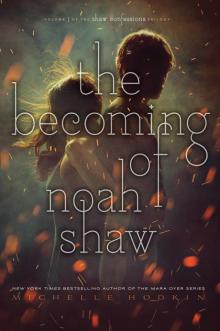 The Becoming of Noah Shaw
The Becoming of Noah Shaw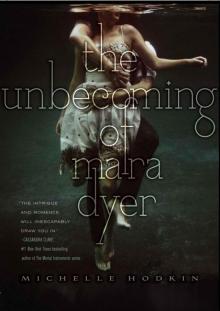 The Unbecoming of Mara Dyer
The Unbecoming of Mara Dyer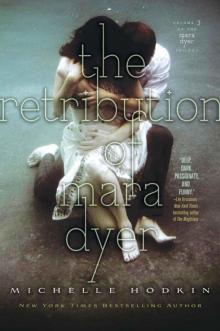 The Retribution of Mara Dyer
The Retribution of Mara Dyer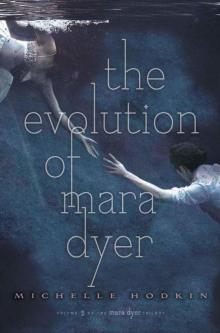 The Evolution of Mara Dyer
The Evolution of Mara Dyer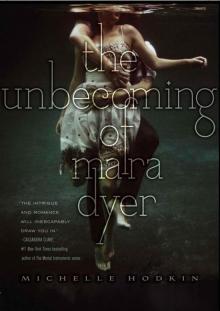 The Unbecoming of Mara Dyer md-1
The Unbecoming of Mara Dyer md-1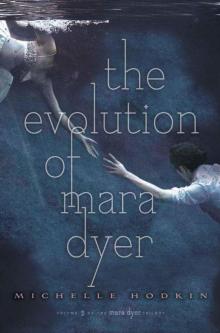 The Evolution of Mara Dyer md-2
The Evolution of Mara Dyer md-2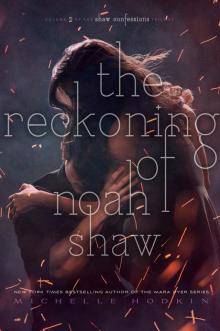 The Reckoning of Noah Shaw
The Reckoning of Noah Shaw